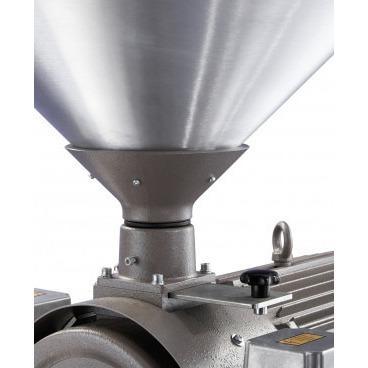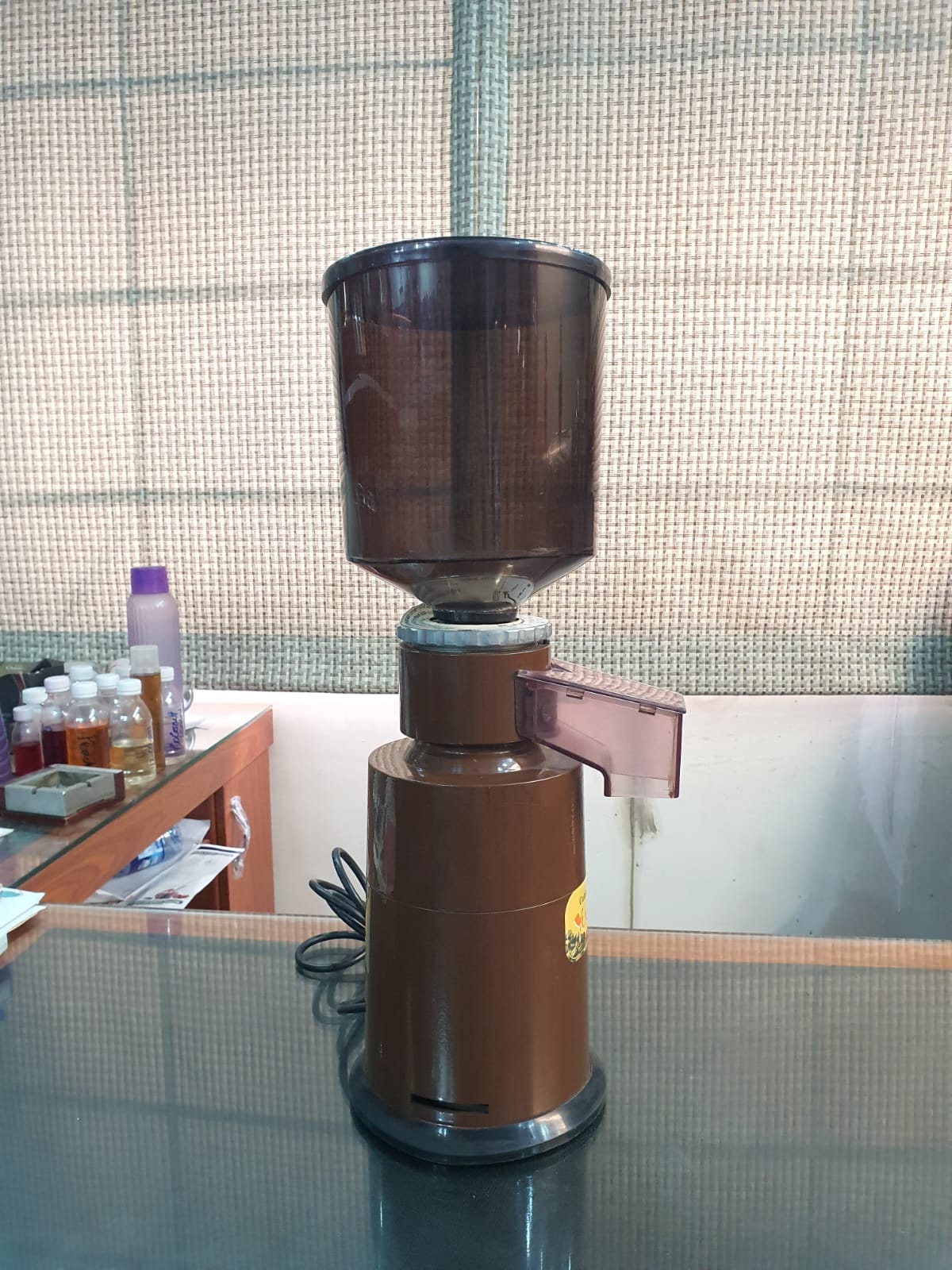Industrial Coffee Grinder for Bulk Coffee Production: What You Need to Know
Industrial Coffee Grinder for Bulk Coffee Production: What You Need to Know
Blog Article
How to Select the Perfect Industrial Coffee Mill for Your Service
Picking the suitable commercial coffee mill for your service is a complex choice that requires cautious consideration of a number of essential elements. It is vital to assess your certain grinding needs, including the volume of coffee refined and the preferred work uniformity, as these elements directly affect flavor and customer satisfaction. In addition, recognizing the different kinds of mills available can considerably influence your operational performance. As you navigate these considerations, one must likewise consider the ramifications of spending plan and upkeep. What various other elements could make or damage your option?
Assess Your Grinding Needs
When selecting a commercial coffee mill, one should first evaluate their grinding demands to make certain optimum efficiency and consistency. This initial analysis entails recognizing the quantity of coffee to be processed daily, along with the desired grind dimension for different developing techniques. A high-capacity grinder may be required for companies offering big quantities of coffee, while smaller procedures may locate an extra portable design enough.
Moreover, it is vital to take into consideration the kinds of coffee beans being utilized, as various beans might call for certain grinding strategies to accomplish the most effective flavor account. Oily beans may require a grinder made to handle such characteristics without overheating or clumping.
Specialty coffee organizations often demand precise grind dimensions to boost removal and flavor, making it crucial to pick a grinder that can supply consistent outcomes. Evaluating the available room and electric demands will certainly aid in picking a mill that fits seamlessly into your functional workflow.
Understand Grinder Kind
Understanding the numerous types of industrial coffee grinders is critical for making an informed selection that satisfies particular operational needs. There are mostly two groups of grinders: blade grinders and burr mills.
Blade grinders utilize spinning blades to chop the coffee beans, leading to an inconsistent grind size - Industrial Coffee Grinder. While they might be more budget friendly, they are typically not ideal for business applications where precision is essential
On the other hand, burr mills provide a much more uniform grind by squashing the beans in between two surface areas. They can be further classified right into level burr and conelike burr grinders. Flat burr mills provide a regular grind dimension and are usually favored for coffee preparation, while cone-shaped burr mills are flexible and can manage a variety of brew approaches, from espresso to French press.
When choosing a grinder, take into consideration the details demands of your organization, including wanted grind uniformity, manufacturing volume, and the sorts of coffee beverages you prepare to supply - Industrial Coffee Grinder. Each mill kind has its limitations and advantages, so comprehending these nuances enables informed decision-making that straightens with functional objectives
Evaluate Grind Dimension Consistency
Accomplishing grind size uniformity is crucial for creating premium coffee, as variations in fragment dimension can substantially impact removal and taste. When picking an industrial coffee mill, it is critical to review just how well the equipment preserves uniformity in grind size throughout different batches. Inconsistent grind sizes can lead to uneven extraction, causing a cup that may taste excessively bitter or weak.
To analyze work dimension uniformity, think about grinders with functions such as adjustable grind setups and premium burrs. Burr mills, in specific, excel in creating uniform bit sizes compared to blade mills. The material and shape of the burrs play a crucial function, with stainless steel and ceramic alternatives offering toughness and accuracy.

Think About Production Capacity
In the hectic world of coffee manufacturing, considering manufacturing capability is vital for organizations aiming to meet need without sacrificing quality. The manufacturing capability of an check my site industrial coffee mill directly affects a business's capability to meet orders efficiently, manage inventory, and react to fluctuating market fads.
When assessing production capacity, it is necessary to examine the mill's output rate, commonly measured in pounds per hour. This measurement must align with your organization's predicted sales quantity and growth targets. A café with a high turn over might require a grinder that can refine a number of hundred extra pounds daily, while a smaller sized operation might be adequate with a reduced ability model.
In addition, take into consideration the sort of coffee being refined. Various beans and blends might affect grinding rate and performance, demanding a grinder efficient in handling varied manufacturing demands. It's likewise worth factoring in the grinder's capacity to keep constant top quality under high output problems, as any type of variations can affect the end product.
Eventually, picking a mill that matches your service's production capability will guarantee you remain receptive and affordable to client assumptions.

Budget and Maintenance Factors
When reviewing the best industrial coffee upkeep, grinder and budget factors play a substantial role in the overall decision-making process,. A first financial investment in a high-quality mill can yield long-lasting advantages, yet it's necessary to develop a clear spending plan that lines up with your organization's operational demands. Consider both the acquisition price and prospective operational expenses, such as energy usage and substitute parts.
Maintenance is another crucial aspect that can affect your spending plan. Industrial coffee grinders require routine upkeep to guarantee optimal performance and long life. Evaluate the supplier's referrals for maintenance, consisting of cleansing routines and parts substitute, as these will affect long-term operational prices. In addition, take into consideration the schedule of service and support, as dependable support can reduce downtime and repair work expenditures.

Buying a mill that is resilient yet very easy to preserve can save money with time. While lower-priced choices might be tempting, they might incur greater upkeep expenses and decreased performance. Eventually, balancing first costs with lasting upkeep and functional efficiency will lead you to the most effective selection for your business's coffee grinding demands.
Final Thought
Selecting the ideal industrial coffee mill requires an extensive assessment of grinding demands, grinder kinds, grind size uniformity, manufacturing capability, and budgetary factors to consider. By prioritizing these elements, companies can ensure the purchase of a trustworthy, reliable mill that fulfills particular functional demands. An appropriate mill not only improves the top quality of the coffee produced but likewise contributes to the overall success and productivity of the business. Long-term efficiency and upkeep simplicity must remain main to the decision-making procedure.
Specialty coffee click resources businesses commonly demand accurate grind sizes to improve removal and taste, making it important to pick a grinder that can provide uniform outcomes. Apartment burr mills offer a regular work dimension and are normally favored for coffee preparation, while cone-shaped burr grinders are flexible and can manage a range of mixture techniques, from espresso to French press.
When picking a commercial coffee mill, it is important to review how well the equipment preserves harmony in work dimension throughout various batches. Burr grinders, in certain, stand go now out in producing uniform fragment sizes contrasted to blade grinders.Selecting the perfect commercial coffee grinder demands a thorough assessment of grinding requirements, grinder kinds, grind size consistency, manufacturing capability, and monetary factors to consider.
Report this page